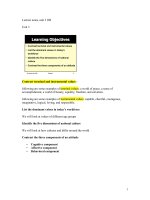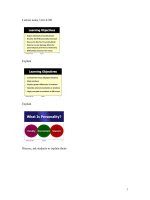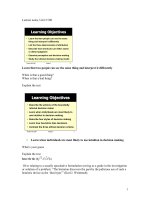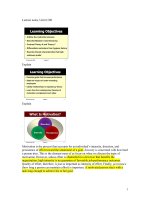Organizational behavior: Lecture 36 - Dr. Mukhtar Ahmed
Bạn đang xem bản rút gọn của tài liệu. Xem và tải ngay bản đầy đủ của tài liệu tại đây (558.91 KB, 47 trang )
Organizational
Behavior
(MGT-502)
Lecture-36
Summary
of
Lecture-35
Human Resource
Policies and
Practices
Career
Performance
Performance
Appraisal
Common Rater
Errors in PA’s
Employee
Compensation
Pay-forPerformance
Today’s Topics
Organizational
Culture
Organizational Culture Is
“The set of shared, taken-for-granted
implicit assumptions that a group holds
and that determines how it perceives,
thinks about, and reacts to its various
environments.”
- Edgar Schein
Organizational Culture?
• A common perception held by the
organization’s members; a
system of shared meaning
–Shared things
–Shared sayings
–Shared doings
–Shared feelings
Culture is a Descriptive
Term
Culture is composed of
perceptions- how employees
see their organization
Definition of Organizational
Culture
• Organizational Culture is the set of
values, often taken for granted, that
help people in an organization
understand which actions are
considered acceptable and which are
considered unacceptable.
• Values are often communicated through
stories and other symbolic means.
Do Organizations have
Uniform Cultures?
• Dominant culture
• Subculture
• Core values
• Dominant culture expresses core
values shared by majority
• Subcultures mini-cultures within an
organization, typically defined by
department designations and
geographically separation and tend
to develop in large organizations
• Core Values or dominant (primary)
values are accepted throughout
organization
Strong/Weak Cultures
Strong culture
Culture in which the core values
are intensely held and widely
shared
Benefits of Strong Corporate
Cultures
Social
Control
Strong
Organizational
Culture
Social
Glue
Aids
Sense-Making
What Do Cultures Do?
Culture’s Functions:
• Defines the boundary between one
organization and others.
• Conveys a sense of identity for its
members.
• Facilitates the generation of commitment
to something larger than self-interest.
• Enhances the stability of the social
system.
What Do Cultures Do?
Culture as a Liability:
• Barrier to change
• Barrier to diversity
• Barrier to acquisitions and
mergers
Organizational Culture and
its Effects
Since organizational culture involves
shared expectations, values, and
attitudes, it exerts influence on
individuals, groups, and organizational
processes.
Socialization and Culture
• Socialization
– Socialization is the process by which
organizations bring new employees into the
culture.
Stories
Rituals
How Employees
Learn Culture
Language
Material
Symbols
Components of
Organizational Culture
• Routine behaviors.
• Norms shared by teams.
• Dominant values.
• Guiding philosophy for policies toward
employees and customers.
• The rules of the game for getting along in
the organization.
• The climate of the organization.









